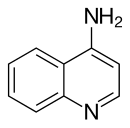User:Crendonb/sandbox
Appearance
4-Aminoquinoline
[edit]4-Aminoquinoline is a form of aminoquinoline with the amino group at the 4-position of the quinoline. The compound has been used as a precursor for the synthesis of its derivatives. [1]
A variety of derivatives of 4-aminoquinoline are antimalarial agents useful in treating erythrocytic plasmodial infections.[2] Examples include amodiaquine, chloroquine, and hydroxychloroquine. Other uses for the derivatives are: anti-asthmatic, antibacterial, anti-fungal, anti-malarial, antiviral and anti-inflammatory agents.[1]
A patent application for 4-aminoquinoline compounds was filed in 2002 and published in 2005.[3]

| |

| |
| Names | |
|---|---|
| IUPAC name
Quinolin-4-amine
| |
| Identifiers | |
3D model (JSmol)
|
|
| ChEMBL | |
| ChemSpider | |
PubChem CID
|
|
| UNII | |
| |
| |
| Properties | |
| C9H8N2 | |
| Molar mass | 144.177 g·mol−1 |
| Appearance | Powder to crystalline, White/Yellow/Orange |
| Melting point | 151.0 to 155.0 °C |
| Hazards | |
| Occupational safety and health (OHS/OSH): | |
Main hazards
|
Causes skin and serious eye irritation |
Except where otherwise noted, data are given for materials in their standard state (at 25 °C [77 °F], 100 kPa).
| |
Tracking categories (test):
References
[edit]- ^ a b Al-Ahmary, Khairia M.; Alenezi, Maha S.; Habeeb, Moustafa M. (2016-08-01). "Synthesis, spectroscopic and DFT theoretical studies on the hydrogen bonded charge transfer complex of 4-aminoquinoline with chloranilic acid". Journal of Molecular Liquids. 220: 166–182. doi:10.1016/j.molliq.2016.04.074. ISSN 0167-7322.
- ^ Bosak, Anita; Opsenica, Dejan M.; Šinko, Goran; Zlatar, Matija; Kovarik, Zrinka (2019-08-01). "Structural aspects of 4-aminoquinolines as reversible inhibitors of human acetylcholinesterase and butyrylcholinesterase". Chemico-Biological Interactions. 308: 101–109. doi:10.1016/j.cbi.2019.05.024. ISSN 0009-2797.
- ^ DeVita, Robert; Chang, Lehua (13 January 2005). "4-Aminoquinoline Compounds" (PDF). United States Patent Application Publication.
{{cite news}}: CS1 maint: url-status (link)
Extra References
[edit]"4-Aminoquinoline 578-68-7 | TCI America". www.tcichemicals.com. Retrieved 2020-03-06.
